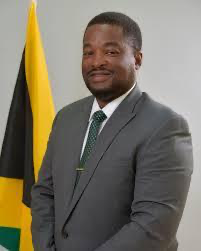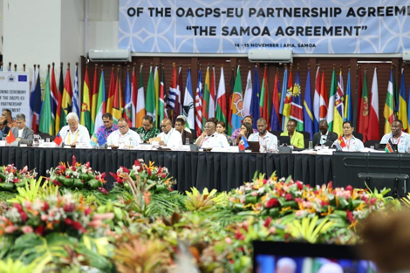Why Jamaica inked the Samoa Agreement
Deputy Speaker of Jamaica’s House of Representatives, Heroy Clarke has admitted that while negotiating the contentious Samoa Agreement was a “ticklish situation,” he is happy the country finally signed because of the financial benefits that will be reaped.
“The end result, is that Jamaica is in a position to continue to get the grants, the loans, the sponsorship. As it is, the main subject areas are really the climate change, the food security, terrorism and other things,” he said during the Internal and External Affairs Committee meeting in parliament on April 17.
“At this time, we really need that funding where climate change is concerned and the whole digital transformation is up right there,” he disclosed.

Clarke, who is the Member of Parliament for St James Central, was elected as the first president of the Caribbean-European Parliamentary Assembly Organization of Africa, the Caribbean and Pacific States (OACPS) in Luanda, Angola in February. He and member of parliament for St Catherine Southern, Fitz Jackson, were the only parliamentarians, apart from the chair, who were in attendance during the committee meeting, which saw representatives from the Ministry of Foreign Affairs and Foreign Trade (MFAFT) providing information about the Samoa Agreement.
Several Christian advocacy groups had expressed concerns about the country’s decision to sign the agreement which they believe was done for financial gains at the expense of our sovereignty and the nation’s children. The group argued that the binding 20-year agreement with the EU will reintroduce the rejected comprehensive sexuality education curriculum back into Jamaican classrooms and undermine Jamaicans’ fundamental rights and freedoms.
Ambassador Sheila Sealy Monteith, permanent secretary at the MFAFT, and head of Jamaica’s Foreign Service, reminded the committee that the EU is the largest provider of grant assistance to Jamaica. Jamaica has received over $1.2 billion euros in development financing from the European Union. In 2021, the EU approved a new financing arrangement which will see six Caribbean countries including Jamaica receiving funding for its national programme. A total of $30 million euro was allocated and approved for 2021 to 2024 for projects in four areas, including digital transitioning. The country could get even more financing under this programme following assessment.
“Over the course of the negotiations, issues of particular interests to some countries emerged with differing levels of support. This was consistent with positions advocated by groups and individual countries in international negotiations on development agreements since the early 2000’s,” she told the committee.
“Some of the most controversial matters, a recurring theme in such negotiations relates to issues of sexuality, abortions and the rights of particular groups of persons,” she noted.
Ambassador Monteith noted several times during her presentation on the agreement that it will be implemented within the ambit of Jamaica’s laws. Jamaica was actively involved in the development of the General and Caribbean protocols for the agreement. Negotiations started in 2018, and the agreement was signed by Jamaica on December 14, 2023. Provisional application commenced on January 1, 2024, although 10 of the 79 ACP countries are yet to sign. Non signatories includes Trinidad and Tobago and Cuba.
“Countries not signatories to the Samoa Agreement will no longer be part of the partnership and will not be able to participate in the OACPS activities or programmes including, support for the justice sector and climate change,” Ambassador Monteith explained.
Jackson noted that the initial partnership between the EU and ACP countries was on the basis of trade under the Lome Convention, however, the focus now is on social issues. He said that there is very little mention of trade under the Samoa agreement and was told that this area of focus has now been placed under the Economic Partnership Arrangement (EPA).

“There are many social issues in Europe that [for] many ACP countries, Jamaica included, there is no concurrence,” he observed, while pointing to the overwhelming focus on social and development agendas.
The senior parliamentarian said it is important that the committee ventilate the issues that are pertinent in agreements such as the Samoa Agreement on an ongoing basis.
“I want to suggest that perhaps on a semi-annual basis there is a review through this committee that the Ministry of Foreign Affairs can provide particularly on this one, because of its sensitivities,” he said.
“One of our remit as parliamentarians is to keep the citizenry abreast and to allay any concerns that they will have [and] provide a forum for dialogue and exchange. The absence of information and knowledge can be a major contributor to much that we don’t desire,” he emphasized.
Advocacy officer for the Jamaica Coalition for a Healthy Society (JCHS), Philippa Davies, welcomed the recommendation by Jackson and the subsequent assurance by the chair that opportunities will be provided for questions to be facilitated about the status of the agreement. She said the JCHS has submitted questions to the MFAFT from as way back as July 21, which are yet to be answered. One of their primary issue is that they haven’t gotten the Ministry’s interpretation of controversial terms that are in the agreement.
She reminded the MFAFT team that their performance is not about them and how impressive they have come across during the negotiations, but instead, the decisions they have taken will have an impact on the Jamaican people.
“We are coming up now to three years since our first engagement with the Ministry by sending the detailed questions about the Samoa Agreement. If the Ministry is unwilling to answer our questions, would they have also denied or declined answering parliament?” she asked.






